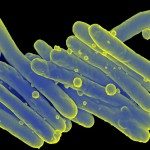Link to Pubmed [PMID] – 27528665
Proc. Natl. Acad. Sci. U.S.A. 2016 Aug;
Interactive link to publication: Proc. Natl. Acad. Sci. U.S.A. (doi: 10.1073/pnas.1604921113)
Abstract
Horizontal gene transfer (HGT) is a major driving force of bacterial diversification and evolution. For tuberculosis-causing mycobacteria, the impact of HGT in the emergence and distribution of dominant lineages remains a matter of debate. Here, by using fluorescence-assisted mating assays and whole genome sequencing, we present unique experimental evidence of chromosomal DNA transfer between tubercle bacilli of the early-branching Mycobacterium canettii clade. We found that the obtained recombinants had received multiple donor-derived DNA fragments in the size range of 100 bp to 118 kbp, fragments large enough to contain whole operons. Although the transfer frequency between M. canettii strains was low and no transfer could be observed among classical Mycobacterium tuberculosis complex (MTBC) strains, our study provides the proof of concept for genetic exchange in tubercle bacilli. This outstanding, now experimentally validated phenomenon presumably played a key role in the early evolution of the MTBC toward pathogenicity. Moreover, our findings also provide important information for the risk evaluation of potential transfer of drug resistance and fitness mutations among clinically relevant mycobacterial strains.







